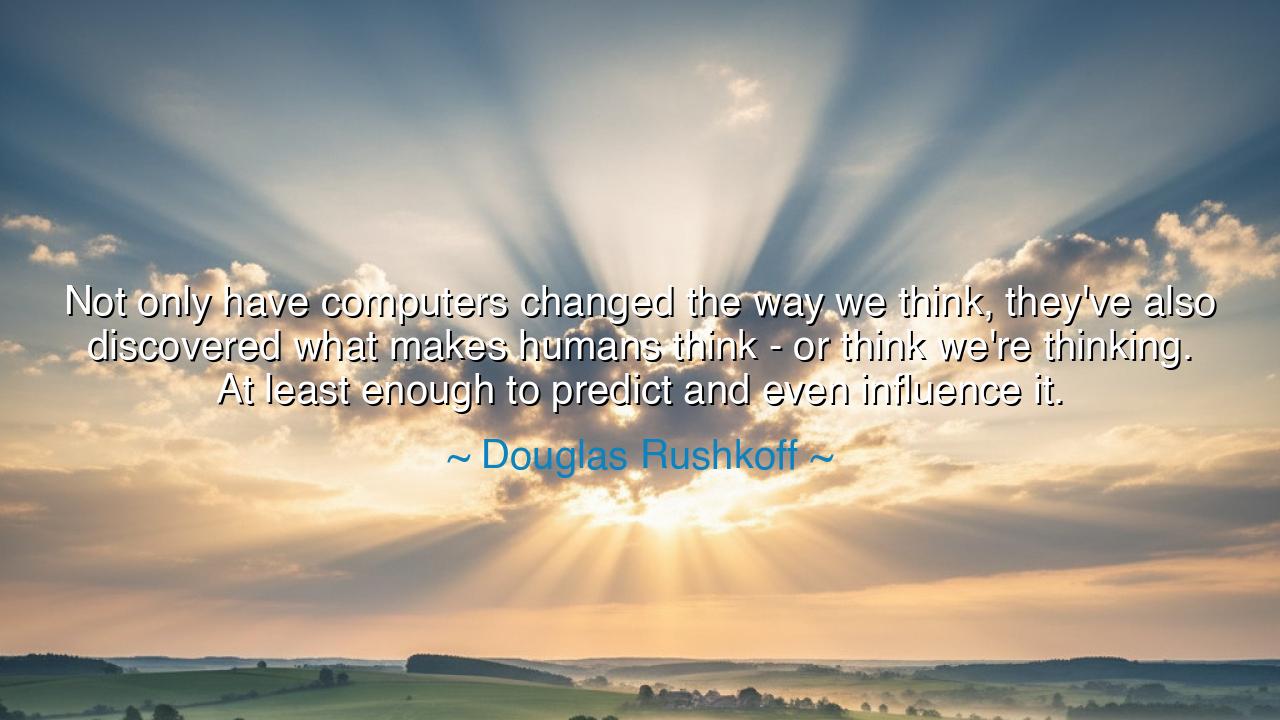
Not only have computers changed the way we think, they've also
Not only have computers changed the way we think, they've also discovered what makes humans think - or think we're thinking. At least enough to predict and even influence it.






In the great unfolding of human history, where the boundaries between nature, intellect, and technology have often blurred, there are moments when we must pause and consider the profound impact that the tools we create have on our very essence. Douglas Rushkoff, in his penetrating reflection on the digital age, once said, “Not only have computers changed the way we think, they’ve also discovered what makes humans think – or think we’re thinking. At least enough to predict and even influence it.” These words, seemingly simple, carry with them the weight of a profound revelation about the power of technology to not only shape human behavior, but to reach into the very core of our minds, predicting and even manipulating our thoughts.
In the ancient world, the search for knowledge and understanding of the mind was a sacred pursuit, deeply connected to the spiritual and intellectual life of humanity. The Greeks, with their philosophers and scientists, sought to understand not just the physical world, but also the nature of thought itself. Plato and Aristotle pondered deeply on the nature of the soul and the workings of the human mind, asking questions about how we think, what drives our actions, and what it means to truly know. Yet, unlike the tools of the modern world, their means of inquiry were slow, introspective, and deeply human—dependent on reason, dialogue, and reflection. Today, as Rushkoff’s words point out, machines—computers—have entered this age-old quest, not just assisting in our understanding of thought, but predicting and influencing it.
The essence of Rushkoff’s statement is that we have reached a point where computers, these tools we once made for calculations, now play an active role in shaping the very process of thinking. The ability of machines to analyze vast quantities of data and predict behavior is now deeply embedded in the world around us. This was not always so. In the ancient world, oracles and prophets were the ones who sought to divine the future, often relying on signs, dreams, or divine inspiration. Cicero, the Roman statesman and philosopher, sought to understand the workings of the mind and nature, yet he never could have fathomed a world in which the future could be predicted by a machine. Technology, it seems, has not only altered how we think but has reached into the very realm of consciousness, and, in many ways, control.
Consider the story of Pythia, the Oracle of Delphi, who was believed to possess the ability to foresee the future by interpreting the messages of the gods. People traveled great distances to seek her wisdom, much like we seek answers today from the digital tools at our disposal. Yet, Pythia’s prophecy was grounded in spiritual and natural forces that humans could not control, while modern technology has created systems that predict our actions based on patterns and algorithms. The difference between the two is stark: where the oracle was a voice grounded in mysticism and divine interpretation, today’s systems of prediction are grounded in data and mathematical models, based on our past behaviors and decisions.
Rushkoff’s insight lies in the realization that this shift—from mysticism to mathematics, from divine prophecy to machine prediction—has changed not only how we act but who we are. The digital age is not just a new chapter in our relationship with technology; it is a profound reshaping of consciousness itself. Computers now have the power not only to predict what we might do next but to influence the choices we make, subtly guiding our thoughts and decisions. Whether it is the suggestions we get from Google, the ads we see on Facebook, or the recommendations we receive from Amazon, we are increasingly living in a world where our thoughts—or at least the illusion of independent thinking—are being shaped by systems beyond our control.
The lesson in Rushkoff’s words is one of awareness and responsibility. Just as the ancient world sought to understand the power of oracles, prophets, and signs, so too must we now understand the power that technology has over our thoughts and actions. To live in the modern world is to be subject to influences that shape our decisions without us even realizing it. The tools we have created are no longer mere instruments—they are active participants in the shaping of our minds. As we continue to embrace the power of technology, we must be vigilant, questioning how it is guiding us and whether it is allowing us to remain the masters of our own minds.
The practical action for each of us is clear: we must engage with the technology we create in ways that preserve our autonomy and independence. While computers and systems offer vast potential for knowledge and progress, we must remain aware of their ability to shape our thoughts and decisions. Just as the philosophers of ancient times carefully studied the nature of the mind and thought, we must do the same in our modern age—ensuring that we are using technology not as a force that shapes us, but as a tool to help us shape the world around us. Let us never forget that our mind is a sacred space, and while technology may assist us, it is our human spirit and free will that must remain the guiding forces of our lives.






AAdministratorAdministrator
Welcome, honored guests. Please leave a comment, we will respond soon